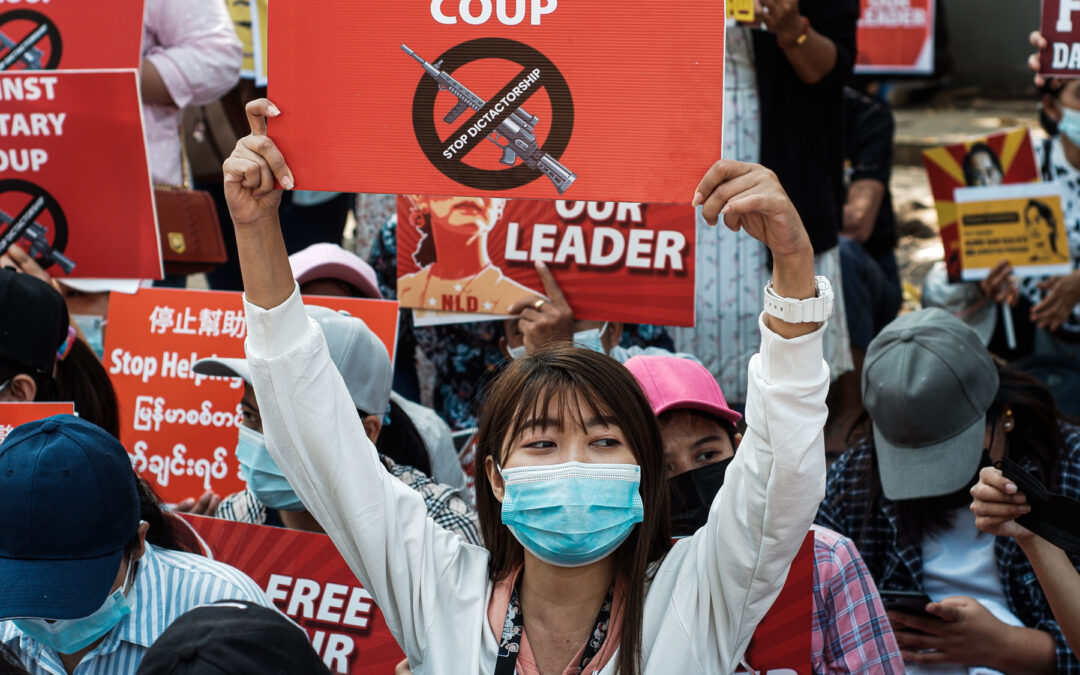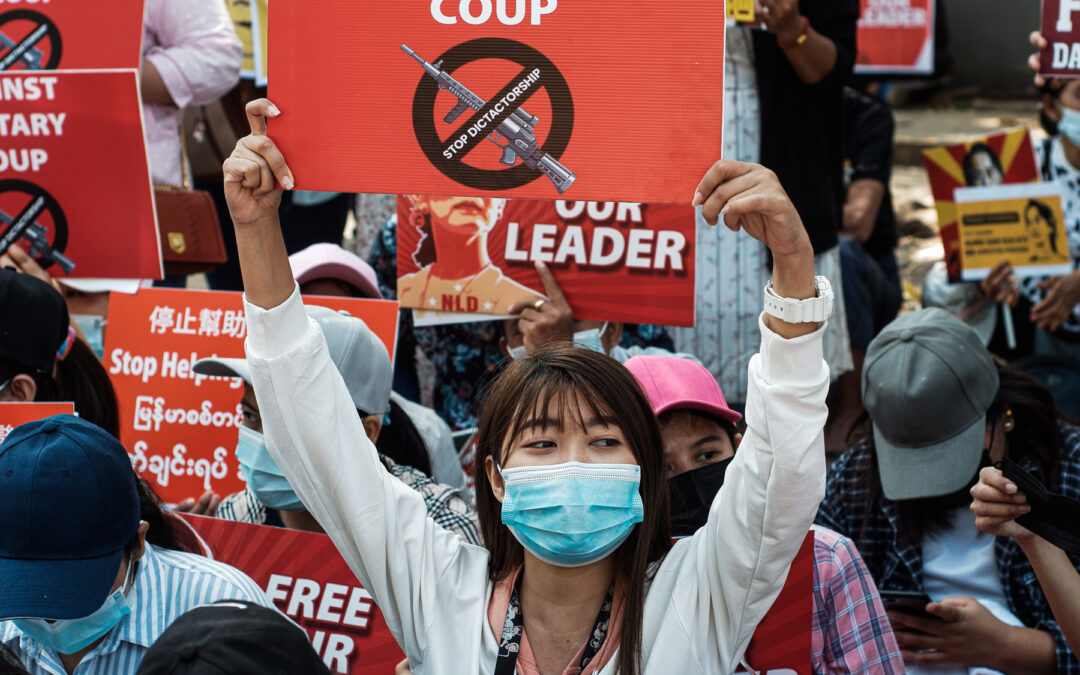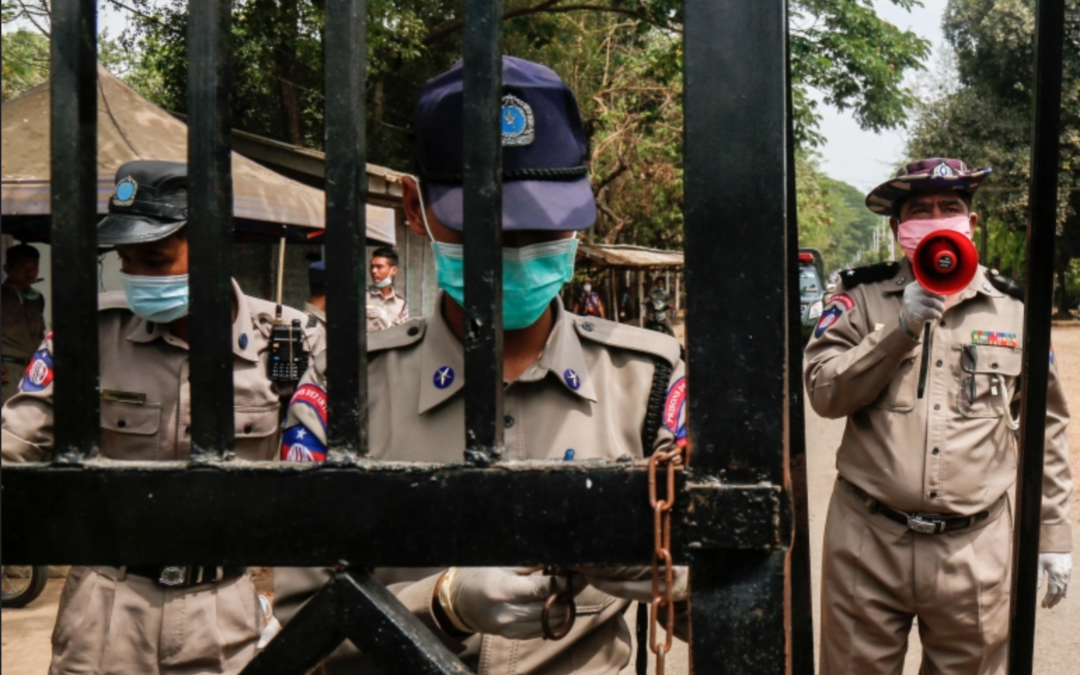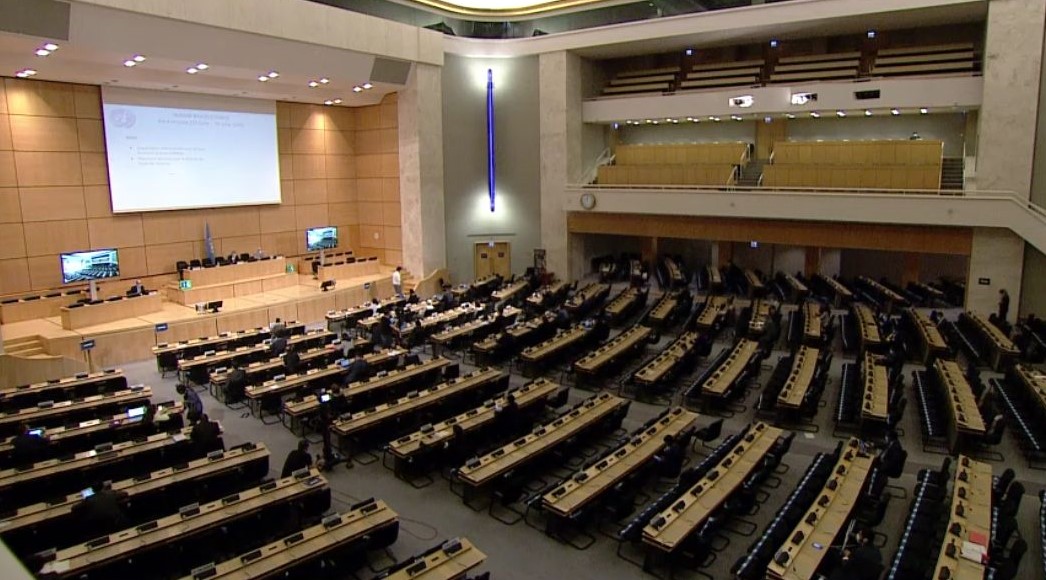
May 21, 2021 | News
The Myanmar military government must urgently reverse recent amendments to the Legal Aid Act that place impermissible restrictions on legal defense for detainees, particularly for those detained on criminal charges, and already vulnerable people such as stateless people, asylum seekers, and migrants, said the ICJ today.
The ICJ stressed that military regime was unlawfully assuming legislative powers it did not possess, in defiance of the core principle of separation of powers.
“The Myanmar military has usurped power illegally and now it is improperly changing the laws to make it even more difficult to get legal aid necessary to defend the rights of thousands of people facing arbitrary arrest and detention,” said Sam Zarifi, ICJ’s Secretary General.
In May 2021, the military regime made key amendments to the 2016 Legal Aid Law, formally entitled The Pyidaungsu Hluttaw Law No. 10, 2016, The 9th Waning Day of Pyartho, 1377, M.E.
The new amendment removes legal aid services at least during pre-trial detention, a critical phase when detainees are particularly at risk of arbitrary detention, torture and ill-treatment and other forms of coercion and tampering with evidence.
The amendments to Section 2(b) prevent all persons from certain vulnerable groups from receiving legal aid, including but not limited to stateless persons, asylum seekers, foreigners, migrant workers.
“These amendments will prevent legal aid for precisely the people who need it most, those facing criminal charges and those from marginalized groups, at precisely the time they need it most, during the pretrial detention when their rights are most at risk,” Zarifi said.
All reference to international standards have been removed as per Section 3(b), thus leaving the terms unbound by normative requirements and restrictions and more vulnerable to be subjected to arbitrary decisions of the Government. The revocation of 3(e) means that the fair standards and procedures concerning how long victims can be arrested and kept in custody do not have to be adhered to.
“In the context of Myanmar, where those pro-bono lawyers and organizations representing detainees continue to face threats, intimidation, abduction and arrest warrants, the possibility of getting legal defense through the legal aid system is critically important to provide access to justice to those thousands of detainees to ensure their right to equality before the law, the right to legal counsel and the right to a fair trial,” Zarifi said.
The United Nations Principles and Guidelines on Access to Legal Aid in Criminal Justice System requires all States to guarantee the right to legal aid in their national legal systems, without discrimination on any grounds.
The latest amendments have removed all independence of the legal aid bodies, and instead given full control to the Supreme Court, supported by the Cabinet—both bodies dominated by the military.
“With a number of lawyers being arbitrarily detained in recent days, these new amendments are another threat tactic by the military, to ensure that those are arrested and detained do not get a fair trial,” Zarifi added.
Contact
Osama Motiwala, ICJ Asia-Pacific Communications Officer, t: +66-62-702-6369 e: osama.motiwala(a)icj.org

Mar 30, 2021 | News
The ICJ today called for the reform of the country’s law on contempt of court to prevent their abuse and for the withdrawal of the contempt action filed against human rights lawyer Charles Hector.
Charles Hector faces potential contempt of court charges over a letter he sent to an officer of the Jerantut District Forest Office, as part of trial preparation. He is currently representing eight inhabitants of Kampung Baharu, a village in Jerantut, Pahang, in their civil lawsuit against two logging companies, Beijing Million Sdn Bhd and Rosah Timber & Trading Sdn Bhd.
The companies applied for leave to commence contempt of court proceedings against Charles Hector and the defendants. They claim that his letter violates an interlocutory injunction order prohibiting the villagers and their representatives from interfering with or causing nuisance to their work.
“Charles Hector is being harassed and intimidated through legal processes for carrying out his professional duties as a lawyer and gathering evidence in preparation for trial. The Malaysian authorities must act to protect human rights lawyers from sanctions and the threat of sanctions for the legitimate performance of their work,” said Ian Seiderman, the ICJ’s Legal and Policy Director.
The harassment of Charles Hector through legal processes violates international standards such as the UN Basic Principles on the Role of Lawyers that make clear that lawyers must be able to perform their professional functions without intimidation, hindrance, harassment or improper interference.
Contempt of court, whether civil or criminal, may result in imprisonment and fines. Malaysia’s contempt of court offense is a common law doctrine and not codified statutorily.
“Fear of contempt charges stands to cast a chilling effect on the work of human rights lawyers and defenders. This further reinforces how Malaysia’s contempt of court doctrine needs to be urgently reformed as it is incompatible with international human rights law and standards,” said Seiderman.
The ICJ calls for the reform of Malaysia’s contempt of court doctrine to ensure clarity in definition, consistency in procedural rules and sentencing limits pertaining to criminal contempt cases. This reform should be in line with recommendations by the Malaysian Bar that the law of contempt be codified statutorily to provide clear and unequivocal parameters as to what really constitutes contempt.
Background
In September 2019, the two logging companies reportedly obtained approvals from the Jerantut District Forest Office to carry out logging in the Jerantut Tambahan Forest Reserve. The eight villagers are from a community many of whose residents have been protesting against the logging. The villagers depend on the forest reserve for clean water and their livelihoods.
On 14 July 2020, the companies filed a writ of summons against the eight villagers in the Kuantan High Court. The writ stated that the plaintiffs had applied for an injunction order to stop the defendants from preventing the companies’ workers from carrying out their works and spreading “false information” online.
On 5 November 2020, the companies successfully obtained an interlocutory injunction order. It was reported that the injunction order prohibits the defendants and their representatives from interfering with the approval given to the plaintiffs by the District Forest Office or causing nuisance to the work of the plaintiffs in any manner whatsoever, including physically, online or by communication with the authorities.
On 17 December 2020 Charles Hector sent a letter on behalf of his clients to Mohd Zarin Bin Ramlan, an officer of the Jerantut District Forestry Office, seeking clarifications on a letter sent by the office on 20 February 2020.
The logging firms contend that the letter violated the injunction order. In January 2021, the companies filed an ex parte application for leave to commence contempt of court proceedings against Charles Hector and the eight villagers.
The hearing was postponed until 25 March 2021 at the Kuantan High Court. On 25 March 2021, the plaintiff’s lawyer opposed the presence and participation of Charles Hector’s lawyer on the grounds that it was an ex parte application, which was contested by Charles Hector’s lawyer. The Court decided to adjourn the hearing to 6 April 2021.
Contact
Boram Jang, International Legal Adviser, e: boram.jang(a)icj.org

Mar 17, 2021 | News
Imposition of Martial Law in several areas of Myanmar subjects civilians to trial by military tribunals, a dangerous escalation of the military’s repression of peaceful protests, said the ICJ today.
“Use of martial law marks the return to the dark days of completely arbitrary military rule in Myanmar. It effectively removes all protections for protestors, leaving them at the mercy of unfair military tribunals.”
– Ian Seiderman, ICJ’s director of law and policy
On 14 March, the Myanmar military issued Martial Law Order 3/2021, covering a number of townships of different provinces in Myanmar. According to this order, military officials assume full authority from civilian officials, and civilians may be subjected to military tribunals for charges of 23 violations of the criminal code and other laws. The 23 crimes include many of the charges used most against peaceful protesters in the past month, including charges of ‘disrupting or hindering government employees and services’ and ‘spreading false news’ about the government, and ‘exciting disaffection towards the government.’
The Martial Law Order also assigns disproportionately severe sentences, including the death penalty and prison sentences with hard labor. Judgments of military tribunals are not subject to appeal, even if the death penalty is imposed.
“Martial law has been imposed in precisely the areas where the military have used unlawful and lethal force against peaceful protesters, and removes even the pretense of access to courts for the people whose rights have been violated systematically by the military, ” said Seiderman.
The ICJ’s detailed review of military courts has documented that they lack competence, independence and impartiality to prosecute civilians. International law provides that the jurisdiction of military tribunals must generally be restricted solely to specifically military offenses committed by military personnel.
“The military courts lack transparency, due process and judicial oversights. It leaves no possibility to appeal the sentences, including the death sentences that have been handed down by military generals, ” said Seiderman.
Since the military coup d’etat of February 1 and the declaration of a state of emergency, the military has enacted and amended legislation enabling ongoing gross human rights violations, including possible crimes against humanity. More than 200 people have been unlawfully killed, with 2,000 more injured as security forces have used excessive force to suppress peaceful protests.
Background
On 14 March, the military-appointed State Administration Council, in accordance with Article 419 of the Constitution, enacted Martial Law Order 1/2021, imposing martial law in a number of areas in Yangon. The affected areas were further expanded through two other orders issued on 15 March, Martial Law Order 2/2021 and 3/2021. These orders transfer all power to the Military Commander in those areas. All local administration bodies have been placed under martial law, effectively giving military full control of all judicial and administrative processes.
The Order 3/2021 in particular is divided into six main sections with the most concerning provisions in relation to the list of crimes to be heard by military tribunals, and the proscribed punishments.
Contact
Osama Motiwala, ICJ Asia-Pacific Communications Officer, e: osama.motiwala(a)icj.org
Mandira Sharma: ICJ Senior Legal Adviser, e: mandira.sharma(a)icj.org









